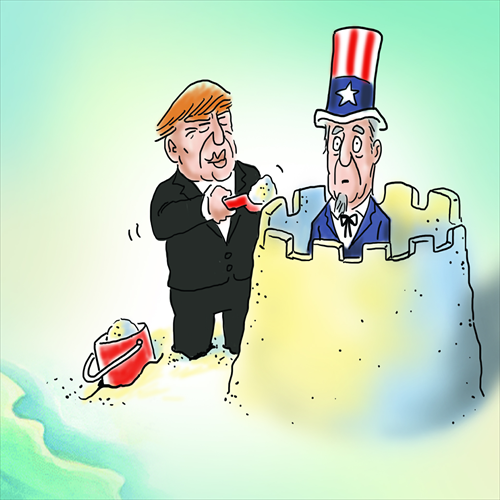


Illustration: Liu Rui/GT
Last month, Donald Trumpsketched his foreign policy by delivering a speech in Washington DC that again reminded some people of the "America First" movement in 1940s that urged the US to refrain from the World War II. However, it seems that Trump has both elements of isolationism and realism, intending to put US interests first and keep the affairs of other countries at a distance.
Trump's isolationism is obvious in his words and expressions. He believes globalization and international unions had already undermined the country's interest and "will never enter America into any agreement that reduces our ability to control our own affairs." Moreover, he insists on shifting more obligations and burdens to allies and even threatened to abandon them if they do not pay for the cost of their own defense.
Trump's speech might win applause from those foreign policy realists as well. He drew a clear distinction from George W. Bush's interventionist neoconservative policy when Trump admitted it was dangerous to "make Western democracies out of countries that had no experience or interests in becoming a Western democracy." It's also different from Barack Obama who intended to impose democracy in Libya, by military force or not, which eventually led to the power vacuum and chaos in the region. Instead, Trump could commit a more restrained foreign policy that would not go "in search of enemies" and proposed to improve relations with China and Russia.
The mixture of isolationism and realism has its own roots in the changing US domestic situation and its weakening international influence. In past months, Trump attracted a large number of blue-collar white voters suffering from economic pain by blaming immigrants. They hold that immigrants, 11 million illegal ones in particular, have taken jobs from US citizens.
To some extent, the rising tide of isolationism in international affairs is an extension of the emerging nativism in domestic sphere.
The shrinking middle class and the enlarging disparity between the rich and poor also contributed to the isolationist thoughts that the next US president should focus more on domestic issues rather than international ones. A new Pew Research Center analysis in May argued that the middle class was shrinking in most US metropolitan areas and median incomes had fallen, too.
According to the research, in 190 of 229 metro areas, the median income has dropped. As the middle class shrinks, people either, most commonly, climb up to the upper class or drop into the lower class with a widening income gap. The frustration and anger of the middle class ask for a more prudent and domestic-oriented foreign policy.
The weakening role of the US in international affairs is an important reason for Trump to pick up realism instead of idealism. The Obama administration took over a country which had not got rid of the financial crisis and the age of fear. With limited resources at hands, Obama intended to end two wars in Iraq and Afghanistan, promote democracy by smart power and reconcile relations with hostile countries by engagement.
However, the US capability to lead is questioned. "Leading from behind" on Libya is criticized as no leadership at all and the European countries blame the US for the migrant crisis.
Trump's doctrine of "America First" coincides with his campaign slogan "Make America Great Again" that admits the weakened US role in the world and emphasizes more on dealing with its own business rather than meddling with affairs of other countries such as transplanting democracy. Trump's foreign policy might be based on a more pragmatic view of US power and its international role.
The US history has witnessed recurring debates on foreign policy such as isolationism versus interventionism or realism versus idealism. Bush was an obvious proponent of interventionism and idealism in international affairs when he launched war on Iraq in 2003 to change the government. Obama returned to realism when he tried to engage with once hostile countries like Iran and Cuba.
It is still too early to say that Trump must be an isolationist or realist if he wins the presidential election since neither his foreign policy idea nor his group of advisors is well shaped. But his speech tells us that he would like to choose a path of both isolationism and realism with the goal of making America great again.
 French girl ties the knot with Chinese boy
French girl ties the knot with Chinese boy Beijing Style: ready for bare legs
Beijing Style: ready for bare legs Century-old station sees railyway evolution
Century-old station sees railyway evolution Enthusiasts perform Kung Fu at Wudang Mountain
Enthusiasts perform Kung Fu at Wudang Mountain Stunning photos of China's fighter jets in drill
Stunning photos of China's fighter jets in drill Monk's mummified body to be made into a gold Buddha statue
Monk's mummified body to be made into a gold Buddha statue Former Chinese solider of the French Foreign Legion seeks wife online
Former Chinese solider of the French Foreign Legion seeks wife online Asia's longest and highest suspension bridge to open to traffic
Asia's longest and highest suspension bridge to open to traffic China's first interactive robot looks like a beauty
China's first interactive robot looks like a beauty Top 20 hottest women in the world in 2014
Top 20 hottest women in the world in 2014 Top 10 hardest languages to learn
Top 10 hardest languages to learn 10 Chinese female stars with most beautiful faces
10 Chinese female stars with most beautiful faces China’s Top 10 Unique Bridges, Highways and Roads
China’s Top 10 Unique Bridges, Highways and Roads Chongqing blazes trail with PPP
Chongqing blazes trail with PPP Only 5% of LGBTI Chinese are ‘out’
Only 5% of LGBTI Chinese are ‘out’ Six Assurances to Taiwan only empty promises
Six Assurances to Taiwan only empty promises Chinese-Filipino community tries to heal rift as South China Sea spat worsens ties
Chinese-Filipino community tries to heal rift as South China Sea spat worsens tiesDay|Week